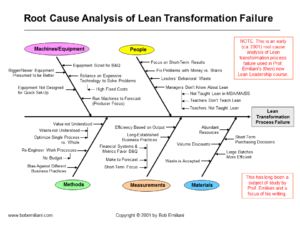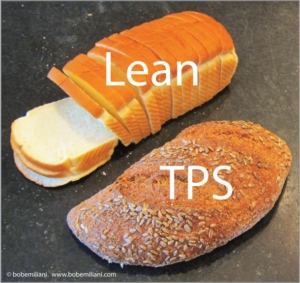It seems my open letter to the Lean Enterprise Institute created a stir in Lean world. My letter challenged LEI, the recognized global leader of the Lean movement, to understand the root causes of failed Lean transformations and identify practical countermeasures, for the purpose of improving the credibility of Lean management and to strengthen the Lean movement. That started interesting discussions on questions such as: “What is Lean failure?”, “Can Lean transformations fail?”, and “How do Lean transformations fail?”
I received strong positive reaction from people who think Lean transformation processes do fail and that failures should be carefully analyzed so that we can learn from them and make improvements to future Lean transformation processes. The general sentiment was that failure offers more and greater opportunities to learn from than success. To that end, I shared the failure analysis method I developed to analyze Lean transformation process failures and other types of company failures.

I also received strong negative reaction from people who think Lean transformations cannot, by definition, fail, because: 1) any improvement is a success; 2) trying is the same as succeeding, or 3) Lean transformation can never fail because it is a work in progress. Other sentiments include (paraphrasing): “Lean can’t fail because it is always a success” and “Lean is a success because company leaders say so.” This, of course, is flawed logic (circular reasoning, to name just one type of illogical thinking that was used), and is therefore not a valid argument.
There was another, related reaction that suggested we should always focus on the positive and not focus on the negative, or not be so negative. I was told, paraphrasing: “You should focus on Lean success and ignore Lean failure, which does not exist anyway.” Unfortunately, that’s not reality and that is not how progress is made.
The basic way of thinking in Lean is that things are a mess and that we have lots and lots of problems – very ugly problems whose existence are real and cannot be denied. These problems need to be recognized, understood, and improved. There is a strong focus on problem-solving using the scientific method and its derivatives (PDCA, kaizen, A3s, etc.) to improve processes. As the saying goes, “You can’t improve if you don’t know about problems.” This negative perspective informs Lean management. Without that perspective, you have Lean in name only.
If we say “Lean can’t fail because it is always a success,” then we don’t truly acknowledge the number and scope of problems in the organization or in our Lean transformation process. In addition, we disrespect people by denying the existence of serious problems that they have experienced, and which may have caused them personal harm.
The strength of Lean management is its focus on weaknesses. Lean management is forward-looking because it can look backwards without blaming people to determine actual causes and identify practical countermeasures to prevent problems from recurring. Lean management us uplifting because together we eliminate the problems that bring us down.
Lean transformation process failure is real; it is not an apparition. Taiichi Ohno recognized the existence of success and failure in relation to TPS:
- “Unless all sources of waste are detected and crushed, success will always be just a dream.” (Toyota Production System, p. 59)
- “We are doomed to failure without a daily destruction of our various preconceptions.” (Just-In-Time For Today and Tomorrow, p. xii)
- “… those who decide to implement the Toyota production system must be fully committed. If you try to adopt only the ‘good parts’, you’ll fail.” (T. Ohno in NPS: New Production System, p. 155)
Can success and failure exist for TPS, but only success exists for Lean? No, it cannot. Success and failure exist for both Lean and TPS, and anyone who tells you otherwise is either vacuous, mistaken, or has a hidden agenda such as keeping up enthusiasm for Lean, selling Lean products or services, saving face, preserving one’s legacy, or the like.
 The view that Lean cannot fail is a new one, and it is more widespread than I had thought. It has arisen, I think, because of confusion that exists between Lean and Toyota’s Production System (TPS). Are they the same or are they different? Are their purpose and goals the same or different? Should anyone care if they are different?
The view that Lean cannot fail is a new one, and it is more widespread than I had thought. It has arisen, I think, because of confusion that exists between Lean and Toyota’s Production System (TPS). Are they the same or are they different? Are their purpose and goals the same or different? Should anyone care if they are different?
Initially, in the late 1980s, Lean was said to be synonymous with TPS. Over time, and because TPS is a great challenge, Lean has devolved into a simpler version of TPS with more diffuse purpose and goals. In practice, it is accompanied by a broader meaning of “improvement,” wherein improvements that do not amount to much, in terms of better business results, are accepted as both genuine and meaningful improvements.
When I see the results of organizations’ Lean efforts, what I see most often is little or nothing in the way of productivity improvement, cost reduction, quantity control, quality control, respecting people, developing employees, and so on, even after 5 or 10 years of effort. The Lean transformation process clearly failed. There may be some improvements that have been made using Lean tools, but there is no Lean transformation.
TPS, on the other hand, has clear purpose and goals related to productivity improvement, cost reduction, quantity control, quality control, respecting people, developing employees, and so on. In other words, if tangible business results are being achieved with respect to the purpose and goals, over the long-term, then TPS is a success. If not, TPS has failed, likely because of many factors including: leaders were not fully committed, people did not detect and crush all sources of waste, and they adopted only the good parts.
It appears, generally, that Lean has failed as a synonym for TPS, though there are specific cases where this is not so. It also appears that the phrase “Lean transformation” may be something that most organizations do not actually want (neither leaders nor workers), preferring instead to make the kinds of improvements that don’t amount to much – but apparently it is good enough. That is their choice, but that’s surely not Lean transformation.
